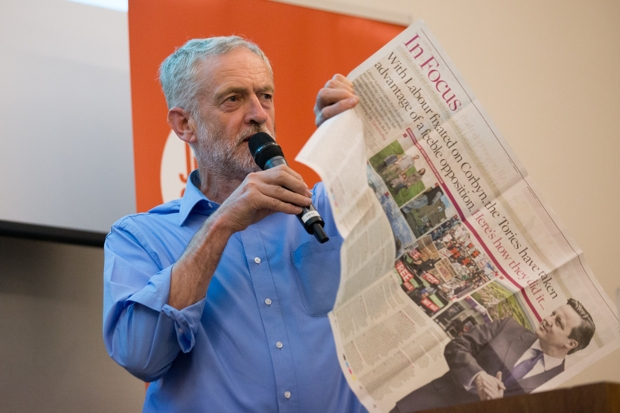Jeremy Corbyn’s Labour party conference speech started pretty well, with him poking fun at the newspapers’ more apocalyptic predictions of what would happen should he become Prime Minister. He teased the Daily Mail for a story saying that he once welcomed the prospect of an asteroid hitting the earth.*
And then, a wee joke. ‘It’s not the kind of policy I’d want this party to adopt without a full debate in conference.’ Everyone, even the press, had a laugh at the press. They were probably even laughing in Iran, where the state broadcaster was showing his speech.
But then Corbyn had to go and spoil it all by denouncing the ‘commentariat’. Again.
‘No one, not me as leader, not the shadow cabinet, not the Parliamentary Labour Party, is going to impose policy or have a veto. The media commentariat simply don’t understand it. They report disagreements as splits, agreement as compromise or concessions as capitulation. No, sorry commentariat: this is grown up, real politics where real people debate real issues.’
A cheer went up in the press hall here in Brighton when he made these remarks. For the journalists, it’s become an amusing trope. But for the public? Does anyone care about how he doesn’t much like newspapers?
But it’s not just Corbyn. The New Left, of whom he is the chosen leader, has a certain view of society: in effect, that people are stupid and have their opinions written by the newspapers they read. That the chief source of right-wing opinion in Britain is newspapers – which are dictated by rich press barons.
As anyone who works in newspaper knows, the reverse is true: a paper only turns a profit if it’s bought by enough people, and is able to reflect their concerns and priorities. But the idea of readers as unwitting victims persists.
At lunchtime I was at a fringe meeting where the Daily Mail was blamed for the fact that the public support welfare reform. Now, that newspaper is bought by just 3 per cent of the population – which, to put it into perspective, is even smaller than the number who support the Liberal Democrats. So why do 60 per cent of the public support welfare reform? Is each edition of the Daily Mail being passed around 20 times?
For broadsheets, the figure is even smaller (below) and shrinking all of the time.
Ah, you might say, what about the millions who read the websites? Ofcom looked into just that recently, factoring in digital, social media, broadcasting etc. It found that the BBC is the hegemon, its digital division has more influence than any newspaper.
[datawrapper chart=”http://static.spectator.co.uk/BeqUu/index.html”]
So maybe Corbyn should be denouncing Huw Edwards next time. Or, even better, drop the whole thing altogether. All this reminds of a Spectator review of Polly Toynbee’s Better or Worse by Danny Kruger:
‘The authors complain that 75 per cent of the circulation of daily papers is ‘owned by … right-wingers’. What this actually means is that 75 per cent of newspaper readers choose to buy right-wing papers. Yet Toynbee and Walker imagine that people cannot make free choices; that the decisions which matter are taken on high; and therefore that it is the job of the “progressive’ Left to take them.’
But Enoch Powell put it best:-
‘For a politician to complain about the press is like a ship’s captain complaining about the sea.’
* The Daily Mail’s story was actually true – it referred to Corbyn signing a Commons Early Day Motion concluding that
‘Humans represent the most obscene, perverted, cruel, uncivilised and lethal species ever to inhabit the planet and looks forward to the day when the inevitable asteroid slams into the earth and wipes them out thus giving nature the opportunity to start again.’
Like he said, the New Politics.








Comments